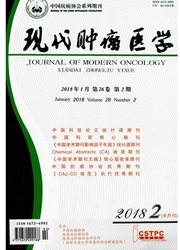

 中文摘要:
中文摘要:
目的:研究环氧化酶-2( COX-2)、甲状腺转录因子-1( TTF-1)及 p63蛋白在非小细胞肺癌( NSCLC)中的表达情况,并探讨其与NSCLC病理类型、临床TNM分期及淋巴结转移之间的关系。方法:采用免疫组化法检测156例NSCLC患者术后病理组织中COX-2、TTF-1、p63蛋白的表达水平。结果:COX-2、TTF-1及p63蛋白在NSCLC组织中的阳性表达率分别为94.5%(137/145)、61.0%(72/118)、53.5%(54/101)。在肺腺癌和鳞癌中,COX-2阳性表达率无显著性差异(p〉0.05),而TTF-1和 p63蛋白阳性表达率具有显著统计学意义( p〈0.001)。COX-2和p63蛋白阳性表达率与NSCLC患者TNM 临床分期、淋巴结转移均无统计学差异( p〉0.05)。在Ⅲ-Ⅳ期或有淋巴结转移的NSCLC病人中,TTF-1阳性表达率显著高于Ⅰ-Ⅱ期或无淋巴结转移的病人( p〈0.01)。结论:在NSCLC病人中,TTF-1和p63蛋白的表达可能分别是腺癌和鳞癌的有效生物标志物,TTF-1的阳性表达可能与肺癌的浸润、侵袭和转移相关。
 英文摘要:
英文摘要:
Objective:To study the expressions of cyclooxygenase-2( COX-2 ),thyroid transcription factor-1 (TTF-1)and p63 protein in non-small cell lung cancer(NSCLC)as well as the relationship between their expres-sions and pathological type,clinical TNM stage and lymph node metastasis. Methods:The expression level of COX-2,TTF-1 and p63 protein were detected by immunohistochemistry in postoperative pathological tissues of 156 NSCLC patients. Results:In NSCLC patients tissues,the positive expression rates of COX-2,TTF-1 and p63 protein were 94. 5%(137/145),61. 0%(72/118),53. 5%(54/101),respectively. COX-2 expression was no significant differ-ence between adenocarcinoma and squamous carcinoma(p〉0. 05),while the positive expression rates of TTF-1 and p63 protein were different(p〈0. 001). The expression rates of COX-2 and p63 protein were not associated with NSCLC TNM clinical stage and lymph node metastasis(p〉0. 05). In NSCLC patients with stage Ⅲ-Ⅳ or lymphatic metastasis,the positive expression rate of TTF-1 was significantly higher than that in stage Ⅰ -Ⅱ or without lymphatic metastasis patients(p〈0. 01). Conclusion:The expression of TTF-1 and p63 protein might be effective biomarkers of adenocarcinoma and squamous carcinoma in NSCLC patients. The positive expression of TTF-1 might be related to infiltration,invasion and metastasis of lung cancer.
 同期刊论文项目
同期刊论文项目
 同项目期刊论文
同项目期刊论文
 SULF2 Methylation Is Associated with In Vitro Cisplatin Sensitivity and Clinical Efficacy for Gastri
SULF2 Methylation Is Associated with In Vitro Cisplatin Sensitivity and Clinical Efficacy for Gastri Personalized primary tumor xenograft model established for the pre-clinicaltrial to guide postoperat
Personalized primary tumor xenograft model established for the pre-clinicaltrial to guide postoperat SULF2 Methylation Is Associated with In Vitro CisplatinSensitivity and Clinical Efficacy for Gastric
SULF2 Methylation Is Associated with In Vitro CisplatinSensitivity and Clinical Efficacy for Gastric Plasma TS mRNA expression as a potential predictive biomarker for pemetrexed and raltitrexed in gast
Plasma TS mRNA expression as a potential predictive biomarker for pemetrexed and raltitrexed in gast Synergistic Anticancer Effects of Polyphyllin I andEvodiamine on Freshly-Removed Human Gastric Tumor
Synergistic Anticancer Effects of Polyphyllin I andEvodiamine on Freshly-Removed Human Gastric Tumor Synergistic anticancer effects of polyphyllin I and evodiamine on freshly-removed human gastric tumo
Synergistic anticancer effects of polyphyllin I and evodiamine on freshly-removed human gastric tumo Thymidylate synthase mRNA levels in plasma and tumor aspotential predictive biomarkers for raltitrex
Thymidylate synthase mRNA levels in plasma and tumor aspotential predictive biomarkers for raltitrex Plasma mRNA expression levels of BRCA1 and TS aspotential predictive biomarkers for chemotherapyin g
Plasma mRNA expression levels of BRCA1 and TS aspotential predictive biomarkers for chemotherapyin g 期刊信息
期刊信息
